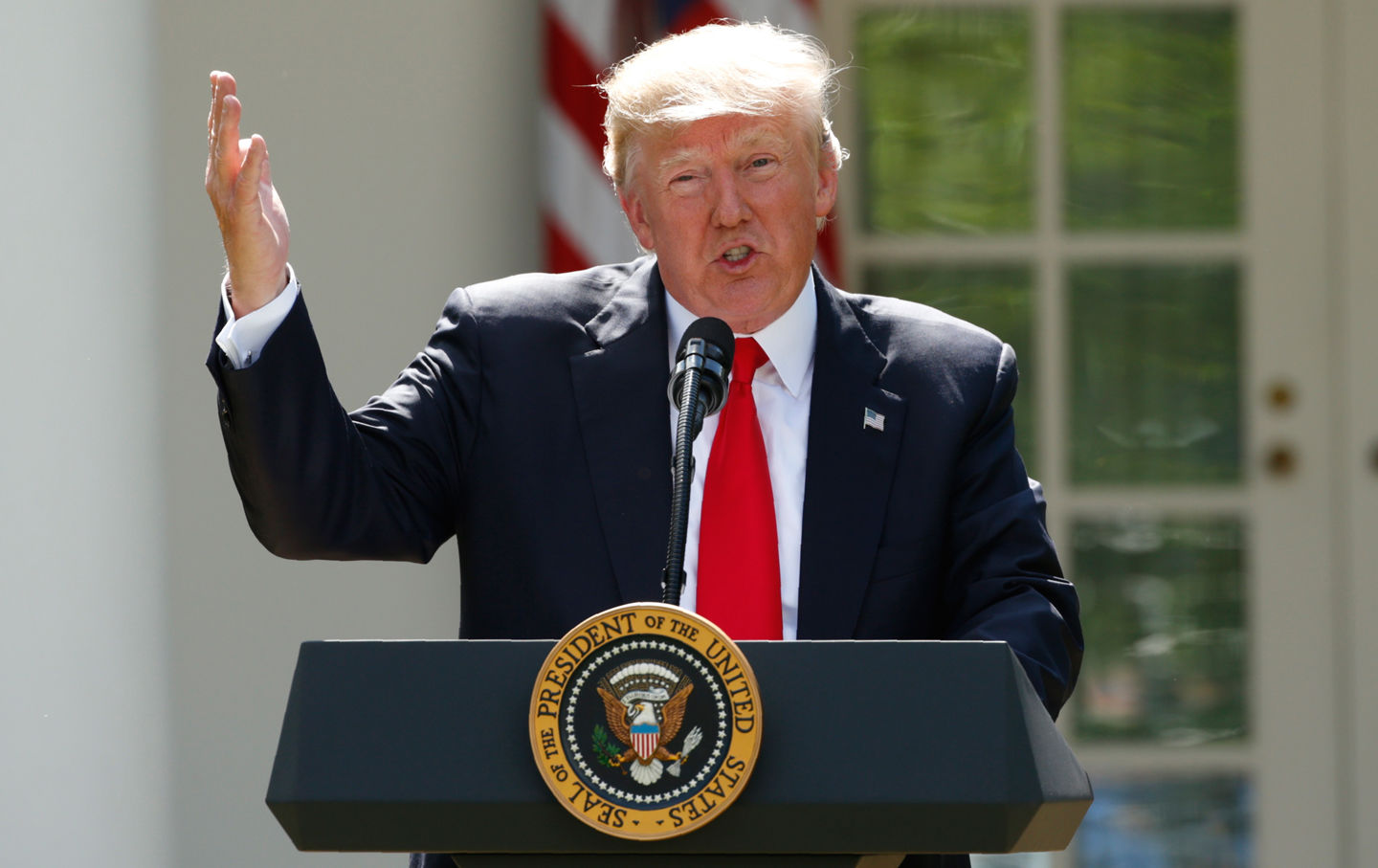Trump’s Paris withdrawal
A debriefing and looking forward
Donald Trump announces in press conference speech the U.S.’s withdrawal on June 1st, 2017
June 12, 2017
Washington – On Thursday, June 1st, President Donald Trump stood before reporters in the Rose Garden to announce that the United States would be withdrawing from the momentous Paris climate accord, claiming that it set unrealistic expectations on American business.
“We’re getting out,” he declared.
When the U.S. initially signed the agreement under the presidency of Barack Obama, the U.S. pledged to decrease emissions by 26-28% from 2005 levels by 2025, while also providing financial aid to developing countries.
Trump’s decision is in affirmation of his previously stated policies on climate change, as well as the president’s desire to “put America first.”
“The United States will withdraw from the Paris climate accord,” he said, “but begin negotiations to re-enter either the Paris accord or an entirely new transaction on terms that are fair to the United States, its businesses, its workers, its people, [and] its taxpayers.”
On November 4th, 2016, the Paris Agreement was put into effect. The agreement is a global effort to combat climate change, combining the efforts of nations around the world.
One of the convention’s goals is to keep the increase in average global temperatures from pre-industrial levels below 2 degrees Celsius. The agreement also strives to find efforts that will further limit this increase to 1.5 degrees Celsius. Another objective is to develop means for countries to adapt to the consequences of climate change.
Parties that have enforced the universal convention are bound by it to “put forward their best efforts through ‘nationally determined contributions’ (NDCs) and to strengthen these efforts in the years ahead,” as the UNFCCC’s official site states. Parties must also provide reports on such efforts as well as emissions.
195 nations have signed the agreement. Syria’s civil warfare puts the country in a position were participating in the accord would be infeasible, while Nicaragua felt that it was ineffective due to efforts being voluntary. Nicaragua also argued that nations that failed to meet expectations should be held accountable.
The U.S. will now join these two countries. However, Syria and Nicaragua have a much smaller carbon footprint than the U.S., the largest contributor to global emissions behind China. So what does the U.S. backing out of the Paris Agreement mean?
Elizabeth Gray is an NYC iSchool English teacher. When asked about her initial reaction to Trump’s withdrawal, she says she “was horrified and deeply upset.”
On how the U.S.’s withdrawal would impact the accord’s success, Gray says,“It’s a little bit hard to say. I’m hopeful for the coalition of American mayors that have come out to say that they’re going to be pursuing their own Paris Accord, essentially. Our mayor is saying he’s still committed to those principles that a lot of other mayors are.”
She also explains why she believes that the withdrawal won’t prove to be beneficial to the country: “In order for us to keep in step with the rest of the world and global economy, we need to make the same strides that other developed nations are making. By taking a step backward we’re no longer competitive in a global market because people are not going to want to buy goods and services from us if they’re not manufactured to be ecologically friendly.”
The U.S.’s withdrawal drew criticisms from both environmental advisors and other politicians.
Elon Musk, though a longtime critic of the fossil fuel industry and Trump’s policies, has been one of the president’s advisors.
However, in response to the president’s announcement, Musk said on Twitter that he is “departing [from] presidential councils,” and adds “climate change is real. Leaving Paris is not good for America or the world.”
iSchool junior Brianly Urena agrees: “The planet’s future is looking negative honestly.”
Urena adds, however, that the other nations within the accord “could sustain themselves,” and states that “coming together as a group and trying to figure out a solution, or just ideas to reduce the impact of climate change, will help us as a whole.”
iSchool freshman Alma Reiss Navarre sees the withdrawal as “a big step backward,” saying that “we’re just going to keep destroying the planet until there’s nothing left if not everyone gets involved. I think it’s really important that we either create a new kind of agreement or rejoin because our resources aren’t going to last long enough.”
Navarre also argues that U.S.’s contributions would be a small price to pay to save the environment: “I don’t think saving the environment is too costly, because we’re spending a lot of money on things we don’t need. I think we could definitely easily refocus that money on something that’s going to help the entire world.”
Former President Obama has also spoken out, retaining a positive outlook on the future: “Even in the absence of American leadership; even as this administration joins a small handful of nations that reject the future; I’m confident that our states, cities, and businesses will step up and do even more to lead the way, and help protect for future generations the one planet we’ve got.”


